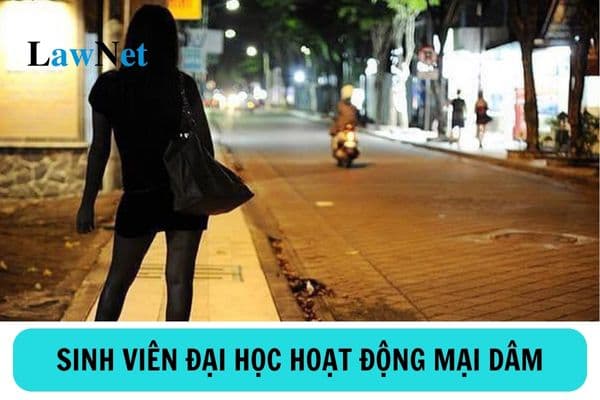Vietnam: What is the disciplinary action against university students engaging in prostitution?
What is the disciplinary action against university students engaging in prostitution in Vietnam?
According to the Appendix issued together with Circular 10/2016/TT-BGDDT specifying details of violation and disciplinary framework for students:

Thus, university students engaging in prostitution will be disciplined as follows:
- For first engaging in prostitution, they will be disciplined in the form of a reprimand.
- For second engaging in prostitution, they will be disciplined in the form of a warning.
- For third engaging in prostitution, they will be disciplined in the form of fixed-term academic suspension.
- For fourth engaging in prostitution, they will be disciplined in the form of forced expulsion.

What is the disciplinary action against university students engaging in prostitution in Vietnam? (Photo from the Internet)
When are students subjected to forced expulsion in Vietnam?
According to Article 9 of the Regulations for student affairs in formal higher education programs issued together with Circular 10/2016/TT-BGDDT, forced expulsion is regulated as follows:
Forms of discipline and details of violation
1. Violating students may, depending on the nature, extent and consequence of their violation, receive warnings, reprimands or may be subject to one of the following disciplinary actions:
a) A disciplinary action represented in the form of reprimand shall be imposed on students who commit less serious violations for the first time;
b) A disciplinary action represented in the form of warning shall be imposed on reprimanded students who continue to commit violations, or those who commit less serious violations in a continual manner, or those who commit violations for the first time which are relatively serious;
c) A disciplinary action represented in the form of fixed-term academic suspension shall be imposed on students who breach rules and regulations or commit serious violations against regulations on student's prohibited acts during the warning period; those who contravene laws and are subject to a suspended sentence. As the case may be, Heads of higher education establishments may consult training rules to make decisions on the suspension term, i.e. the term of one semester, one academic year or the term the same as the suspended sentence period.
d) A disciplinary action represented in the form of forced forced expulsion shall be imposed on students who continue to breach rules during the fixed-term suspension period, or commit violations for the first time which have extremely serious nature or level and cause adverse effects on their higher education establishments and society; those who contravene laws and serve jail sentences.
2. A disciplinary action which is at least a warning must be recorded into student administration documentation and informed to student's families. Where students are subject to fixed-term suspension or forced expulsion, higher education establishments must inform local authorities and student's families for their coordination in supervision and education of these students.
3. Details of violation and disciplinary framework shall be prescribed in the Appendix hereto attached.
Thus, students are subjected to forced expulsion when:
- Students continue to breach rules during the fixed-term suspension period or;
- Students commit violations for the first time which have extremely serious nature or level and cause adverse effects on their higher education establishments and society;
- Students ontravene laws and serve jail sentences.
What are the duties of students in Vietnam?
According to Article 4 of the Regulations for student affairs in formal higher education programs issued together with Circular 10/2016/TT-BGDDT, students have the following duties:
- Observe the Vietnam Communist Party's strategies and guidelines, the State laws and policies, university’s statutes and rules and regulations of higher education establishments.
- Carry out study and training activities according to education and training plans and programs developed by higher education establishments; show proactive and enthusiastic behaviors towards self-study and research, creativity and training in moral standards and lifestyle.
- Respect teachers, administrative officers and personnel of higher education establishments; demonstrate solidarity and assistance for other students during their learning and training process; promote civilized ways of life in the educational context.
- Preserve and protect school property; contribute their efforts to conserving, building and promoting traditions of higher education establishments.
- Strictly comply with regulations of higher education establishments on health checks prior to commencement of their campus life and regular health checks while on campus.
- Pay tuition and health insurance fees in full and on time.
- Participate in community service, volunteering and social work activities, depending on their ability and physical condition, at the higher education establishment’s request.
- Comply with obligations to work for a fixed period according to the State Personnel Decision after access to grants, scholarships or tuition subsidies given by the State or sponsored by foreign entities under Agreements with the State. In case of failing to comply with these obligations, students are required to repay these monetary amounts as prescribed by the Government.
- Participate in prevention and control of misconduct or dishonesty in learning, exams and other activities; report on time to departments, functional divisions, Heads of higher education establishments or other regulatory authorities whenever discovering such misconduct or dishonesty or any other offences against laws and other rules or regulations which are committed by students, staff and lecturers of higher education establishments.
- Participate in public security, order, traffic safety, criminal and social evil prevention and control activities within the precinct of a higher education establishment, family and community.
- Fulfill other relevant duties regulated by law and higher education establishments.

